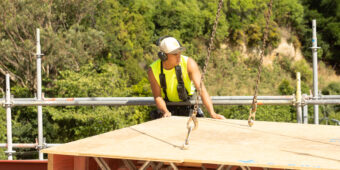LBP fined for reckless substitution
21 Jul 2023, Industry News, News

A Canterbury Licensed Building Practitioner (LBP) has been fined after he was caught using an unauthorised, imported roofing product to save money
Scott Lilly was ordered to pay $3,000 and costs of $500 after the Building Practitioners Board found him guilty of negligence and bringing the regime into dispute, after he swapped consented roofing material for a Chinese product.
The Board heard that Lilly substituted a consented MetalCraft roofing product for one by manufacturer Zibo Wangshun Building Materials Company, without obtaining an amendment for
the substitution.
Selwyn District Council brought the case against Lilly when the purchaser of a house his company had built noticed “a deterioration of the roof’s paint” and made a complaint to the Council. It was only after the complaint that the deception was uncovered.
From a shed to a roof
Lilly originally purchased the Zibo Wangshun product to use on a shed built at another property, but decided to use left-over product to roof houses with. It was installed by another LBP, without notice being given to the Building Consent Authority.
“When initially confronted with the issue, the Respondent (Lilly) claimed the roofer had supplied and installed the product and submitted that all that was required to rectify issues was a repaint,” said the Board.
Lilly later admitted that his company, New Style Homes Limited, supplied the substituted roofing product but claimed it met Building Code requirements. In his argument, he stated:
- NZ testing of roofing material thickness and paint thickness was done and confirmed by SGS Industrial (Auckland).
- Testing was undertaken to satisfy the Waimakariri District Council that the substitute roofing iron complied with NZ Building Standards.
Waimakariri District Council also undertook its own investigation to confirm the ZIBO Wangshun Building Materials Company meets international standards for certification using a local interpreter.
Overstating the truth
However, the Board says that it wasn’t able to verify Lilly’s claims, and found claims that the BCA had accepted the product to be “an overstatement”. The Board continued: “No evidence has been provided to show that the metal thickness met compliance requirements. The Board could not identify any evidence that the metal thickness had been tested.”
Furthermore, the Board found that “there was no basis on which the Zibo Wangshun product could be considered a comparable product”.
“Looking at the Zibo Wangshun product, it is not CodeMarked, and there was no evidence that an appraisal had been carried out and accepted by the BCA at the time it was used. It should also be noted that the burden of proving that a product meets Building Code requirements sits with the person who seeks to use it.”
A missing consent
The Board found that Lilly should have submitted a building consent amendment for the product substitution. As the LBP who was directing and controlling the build, it was his responsibility to ensure the building consent was complied with, or to ensure changes to the consent were approved as the build progressed.
As Lilly failed to ensure an amendment to the consent was obtained, he had “in essence allowed unconsented building work to take place because he was in the best position to ensure unconsented work did not occur”.
When considering whether the decision to use an unauthorised substitution was negligent or not, the Board stated:
“The decision to substitute the roofing product was calculated and, on the face of it, appears to have been done to save money. There is no evidence that there was a lack of availability of the consented product or any other reason why the change was necessary. Irrespective of the motivations, in addition to the Respondent failing to process the change, at no stage did he inform the BCA of it. Given those factors, the Respondent’s failure was not inadvertence or carelessness. The conduct was deliberate, and it reached the threshold for the Board to impose a disciplinary sanction.”
Additionally, it was discovered that the substituted product was used on several other homes. However, Lilly was unable to say how many.
Bringing LBPs into disrepute
When discussing whether Lilly’s conduct was disreputable, the Board noted that there is evidence his failure to obtain a building consent amendment was not an isolated instance, that home buyers believed they were purchasing a home with a roof that met Building Code requirements, backed by product guarantees issued in New Zealand, and that his conduct was motivated by financial gain.
“The Board also finds that the Respondent has displayed a reckless and dangerous attitude toward the consenting process. The conduct went beyond negligence. It put the purposes of the Building Act at risk.”
After considering the evidence, Lilly was found to be guilty of bringing the LBP regime into disrepute and of negligence. He was also sanctioned in 2015 for failing to adhere to consenting processes.
In total, he was fined $3,000 and ordered to pay $500 towards the costs and expenses of the Board.
Further action unlikely
According to Selwyn District Council, no Code Compliance Certificates have been revoked by the council and they were not progressing a further investigation as they lacked evidence
to demonstrate non-compliance.
“Deciding if there was a breach would require taking samples of the roofing iron from the roof of each house for testing, which would be invasive and destructive to the roof,” said Selwyn District Council Building Manager Vanessa Mitchell.
“From our observations and further detail provided in the board’s decision document, we have no reason to believe that the alternative product installed will not meet the durability requirements of the Building Code. The coating failure identified is essentially a cosmetic issue, rather than a weathertightness issue.”
Register to earn LBP Points Sign in



